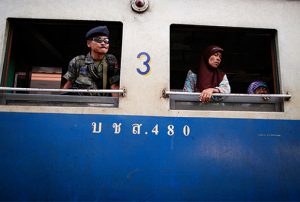Southern Thailand: Dialogue in Doubt
International Crisis Group
The south Thailand insurgency has grown less lethal over the past year, but there are worrying indications militants may have expanded operations beyond the traditional conflict zone of the four southernmost provinces. Malay-Muslim rebels have been fighting against Thai rule for more than a decade in what they see as a national-liberation struggle. An official dialogue process between Bangkok and separatist leaders that began in 2013 was doomed by divisions on both sides. Since the 22 May 2014 coup in Bangkok, the junta has focused on preserving bureaucratic and military prerogatives. Although it has vowed to pursue talks, the junta rejects pluralism and political debate, promoting “Thainess” and “unity” concepts that are unlikely to reduce tensions in the south. Resolution of the conflict demands a new relationship between the state and society in the region, which will most likely require greater political decentralisation. All sides should now work to prepare infrastructure for future talks, including dedicated dialogue teams, communications procedures and means for popular participation.
In February 2013, the Yingluck Shinawatra government initiated a dialogue process, facilitated by Malaysia, with representatives of Barisan Revolusi Nasional Melayu Patani (Patani-Malay National Revolutionary Front, BRN), the principal insurgent group. After three plenary meetings, and before advancing to confidence-building measures, this “Kuala Lumpur Process” collapsed, undermined by rifts on both sides of the table, but though rushed and bungled, it changed the conflict’s dynamics. A Thai government had acknowledged the political nature of the insurgency and committed to dialogue. BRN was compelled to depart from its habitual reticence and articulate a political platform.
The dialogue also highlighted deficiencies that the protagonists must address if any new process is to succeed. For the militants, these include a lack of capacity within the political wing and internal discord on the merit of talks. The Thai side also lacks experience in negotiations of this kind, and its internal divisions are arguably deeper than those on the militant side. The military’s public scepticism about the Kuala Lumpur Process highlighted the fundamental problem of the institution’s independence from elected authority.
After the May 2014 coup, this became moot. The ruling National Council for Peace and Order (NCPO) restructured the bureaucracy responsible for the region. Enhanced counter-insurgency measures contributed to a significant drop in violent incidents and casualties. In spite of this achievement, the security picture is mixed. Late 2013 witnessed coordinated bomb attacks outside the traditional conflict zone and disquieting evidence of possible militant operations in Phuket. On 10 April 2015, a car bomb on the tourist island of Koh Samui showed some of the hallmarks of militant attacks, and all known suspects in the incident are Malay Muslims. These bombings could indicate a new phase of the conflict, though questions remain about the motivation behind them.
The military government has formally committed to dialogue, but after a year in office, there is no evidence of progress. Officials insist that they are quietly making secret overtures to potential militant interlocutors. The junta’s centralisation of power and its sworn obligation to preserve the kingdom’s unity cast doubt, however, on its readiness to compromise. Some militant groups in exile have joined together to pursue dialogue under the banner of the Patani Consultative Council (Majilis Syura Patani, MARA Patani) but BRN hardliners remain uncommitted. Without the movement’s full participation, any dialogue process would be forlorn.
Given the current adverse environment for conducting substantive talks, the actors should concentrate for now on establishing a durable framework and institutions that can carry such negotiations forward when that environment becomes more favourable. Once initiated, official dialogue should first focus on modest goals such as agreement on acceptable designations for all parties and communication protocols between delegations and with the media. Agreement on procedural issues would represent genuine progress in what will be a long process.
RECOMMENDATIONS
To lay the foundations for a durable official peace-dialogue process
To the government of Thailand:
- Lift restrictions on the exercise of basic rights, especially freedom of speech and freedom of assembly, to enable pursuit of change by peaceful means.
- Give serious consideration to recognising an official dialogue process with Malay-Muslim militant groups as a national-agenda priority, endorsed by the National Legislative Assembly.
- Establish an official peace-dialogue unit, reporting to the prime minister, with a full-time staff and a mandate to support, through research, documentation and other activities, the Thai delegation in seeking a negotiated end to the insurgency.
- Provide credible security guarantees to militant leaders willing to engage in the official dialogue process.
To the BRN and other militant groups:
- Commit to participate in an official dialogue process with representatives of the Thai government, recognising that self-determination is compatible with preservation of Thailand’s territorial integrity.
- Empower their political wings and develop their capabilities in research, analysis and communications in order to promote effective participation in the dialogue process.
- Cease attacks on civilians, in accord with obligations as non-state armed actors under international humanitarian law.
To the government of Thailand and militant groups:
- Collaborate with an unofficial, parallel track, coordinated by local civil society organisations, to deliberate contentious issues and ensure that alternative perspectives and interests inform the dialogue agenda.
To the government of Malaysia:
- Foster cooperation among militant groups in exile and ensure that representation in any umbrella organisation is proportional to the groups’ relative strength.
- Facilitate training of existing and prospective militant leaders in negotiation, peace processes and sub-national government.
Bangkok/Brussels, 8 July 2015 – Asia Report N°270
The International Crisis Group kindly allows Modern Tokyo Times to publish their esteemed articles based on important research. Please check the website of this highly valued international organization at http://www.crisisgroup.org/
https://twitter.com/CrisisGroup International Crisis Group on twitter
Photo: Reuters image that is in the original article by International Crisis Group
